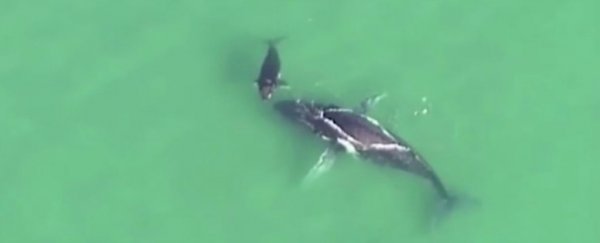In a scene straight out of a Disney movie, a small humpback whale calf was witnessed pushing its mother out to sea on Friday, after she got stranded on a sandbank off the east coast of Australia.
The remarkably stressful, yet heart-warming, story unfolded over the course of 40 minutes near North Stradbroke Island, which lies 100 kilometres (62 miles) southwest of Brisbane.
"Both mum and bub are doing well and we've been keeping an eye on them to make sure they clear the shallow waters," officials from the Queensland Parks and Wildlife Service (QPWS), who were dispatched to help the two whales, said on their Facebook page on Friday afternoon.
"If you're out in a boat today can we ask that you stay clear and give them a bit of space to swim free?"
While it's not entirely clear how the whale managed to get itself stuck in the first place, humpback whales are pretty common off the Queensland coast at this time of year, because they're known to give birth nearby before swimming with their calves back down towards Antarctica for summer.
Luckily, the mother was travelling with her calf, and the young whale was able to gradually nudge its mum with its head until she cleared the sandbank. The incoming tide also helped the young calf, and the pair didn't end up needing any human assistance.
"The whale was able to free itself and the adult and the calf were able to swim away," a spokesperson for the QPWS told the BBC. "The mother was a bit tired and distressed."
You can see the rescue in action below:
This isn't the first – and won't be the last – time a whale has accidentally beached itself. Back in 2015, fishermen and beachgoers in Chile helped a gigantic blue whale – measuring about 20 metres (65 feet) in length – back into the water using nets and a whole lot of teamwork.
And for many species of cetaceans (aquatic marine mammals), beachings are becoming more common.
So, what should you do if you ever happen to find a stranded whale on the beach? The first thing to keep in mind is that under no circumstances should you try to rescue the animal yourself.
"The most important thing to do is to urgently seek out expert help," US-based charity Whale and Dolphin Conservation recommends.
After sending for aid, the best thing you can do to help is to keep dogs and other pets away from the animal and walk calmly up to it to make sure its blowhole is above water so that it can breathe.
If not, the WDC says, you should very carefully try to roll the whale onto its belly so it can breathe. Be sure not to pull on any fins or get any water into the blow hole in the process. Do not try to pull in into the water because you might injure it.
After that, there's nothing to do but wait for the experts to arrive and help the animal get it back into the water.
But hopefully, just like this week, you won't have to use that advice, and a little calf will be on hand to help rescue stranded members of its pod.
You go, little whale!
